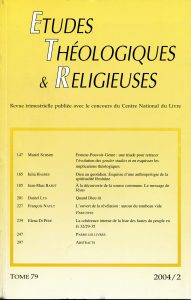La liste des péchés du peuple en Jr 32,29-35 fut un temps qualifiée d’incohérente. Par une étude littéraire de ce passage, Elena Di Pede en montre ici toute la cohésion. La liste, fort construite, met en évidence à la fois l’idolâtrie du peuple et sa cause profonde, à savoir le refus d’écouter une parole de vie, ce qui mènera Israël à son autodestruction. Parallèlement, la complexité de la rédaction fait pressentir au lecteur quelque chose de la situation chaotique dans laquelle le peuple s’est plongé en raison de ses fautes.
The internal coherence of the list of the faults of the people in Jer 32.29-35.
The list of the people’s sins in Jer 32 : 29-35 was once seen as inconsistent. Through a literary reading of this passage, Elena Di Pede shows how consistent it actually is. The quite elaborate structure of the list points both to the idolatry of the people and to its deeper cause – namely their refusal to listen to a living word, therefore leading Israel to its self-destruction. At the same time, through the intricate writing of the passage, part of the chaotic situation the people have thrown themselves into because of their faults can be sensed by the reader.
p. 239-246
Auteur
DI PEDE Elena
Elena DI PEDE est professeure d’Ancien Testament au département de théologie (CAEPR) à l’université de Lorraine (UFR Sciences Humaines et Sociales – Metz), membre du centre de recherche Écritures (EA 3943).
